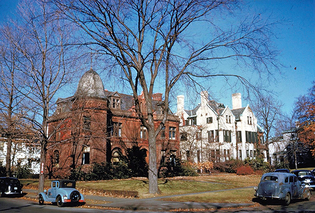
Manuscripts and archives
Henry Barnard Hall at 28 Hillhouse Avenue was the first home of the education department in Yale’s Graduate School. It now houses the economics department.
View full image
Just over 100 years ago, in 1920, Yale bought the Charles Farnam mansion at 28 Hillhouse Avenue to house a new Graduate School department: education. A few years later, the house was named Barnard Hall, in honor of Henry Barnard, Class of 1830, a public-education pioneer. For three decades, the department influenced American education, until its decline and closure in the administration of Yale president A. Whitney Griswold ’29, ’33PhD—just one of many episodes in the waxing and waning history of education as a curricular subject at Yale.
The university had begun awarding PhD degrees in education back in the 1890s. The first course, Pedagogics, was taught in the fall of 1891 by E. Hershey Sneath ’84, ’90PhD. By the 1910s, President Arthur Twining Hadley ’76 and university secretary Anson Phelps Stokes ’96 were stepping up their efforts to emulate the education programs at other Ivy League universities. After World War I ended and Yale reorganized, the trial courses of instruction Hadley and Stokes had encouraged led to the establishment of the new education department of the Graduate School.
Over about 35 years, a total of 8,611 students “took work” in the department. Some 1,125 matric-ulated in the Graduate School as degree candidates; most of the rest were extension students, including teachers keeping up their in-service requirements. In all, 879 students received a master’s or doctorate. The first chair of the education department was Frank E. Spaulding, a Sterling Professor (a high honor at Yale). He was succeeded by Clyde M. Hill, also a Sterling Professor, in 1929.
Two women taught during the first two years of the education department. Catherine Turner Bryce was the first woman assistant professor at Yale. She was a popular author of children’s literature textbooks, and she taught in elementary education. Margaret Evertson Cobb was a research and clinical assistant in Yale’s psychology clinic. Their brief appointments lasted from 1920 to 1922.
In 1923, Bessie Lee Gambrill became assistant professor of elementary education—and later, the first woman to earn tenure at Yale in a subject other than nursing. After her death in 1988, at the age of 105, the New York Times noted that “she was known for her work on intelligence tests for children and for promoting mental hygiene programs in schools.”
From 1952 to 1954, three professors who made up half the education department’s full-time faculty left Yale. Gambrill and Hill retired, and Samuel M. Brownell ’26PhD became the US commissioner of education. At the same time, skepticism about pedagogy as an academic field was becoming more common, at Yale and around the country. The university discontinued the department. The last doctoral candidate received his degree in 1958.
After the department folded, Yale focused its education efforts on a program established in 1951, the master of arts in teaching. The MAT was designed to prepare college graduates to teach in secondary schools, in a time when they were sorely needed. In November 1954, a Yale Daily News article quoted Griswold’s Report to the Alumni: “The crisis in our schools casts a lengthening shadow over our colleges and universities.” The News proclaimed: “Well said Mr. President. After ignoring the secondary-school problem, or at least after an extended period of passivity, Yale flexed its creative muscles last spring and announced its intention of expanding the somnolent Master of Arts in Teaching department, which had been in quiet existence for four or five years.”
Around 1970, the MAT program too was phased out. Since then, Yale has continued to experiment with teaching the theory and practice of teaching. From 1973 to 2011, undergraduates interested in teaching at public schools could take courses in pedagogy in Yale’s Teacher Preparation Program. From 2006 to 2011, the university had an Urban Teaching Initiative; it offered a tuition-free master’s degree and certification to college graduates who would go on to teach in a New Haven public school.
Most recently, in 2013, Yale College launched an interdisciplinary effort called the Education Studies Program. It doesn’t offer a path to certification or a major—it is intended to complement an undergraduate’s major—but it provides courses on education for students who are considering becoming teachers or educational experts in the future, or who are simply interested in the subject. The program’s website urges students “to critically reimagine and collectively reshape the education landscape through research, policy, and practice.”
 loading
loading
1 comment
-

Charles deNicolo , 12:30pm December 22 2020 |  Flag as inappropriate
Flag as inappropriate
The comment period has expired.I seem to recall that the Yale Teaching programs lead to the New Haven Teaching College that later became Southern Connecticut State College/University.